Index relies entirely on the support of donors and readers to do its work.
Help us keep amplifying censored voices today.
The arrest of French comedian Dieudonné today appears to be connected to a Facebook comment he posted after Sunday’s march in Paris in which he said he felt he “finally returned home… I feel like Charlie Coulibaly” – remarks that have been interpreted as condoning the action of one of the terrorists involved in the killings of 17 people in Paris last week.
It is important to be clear that while incitement to terrorism is a crime, commentary or jokes about terrorism – no matter how offensive or tasteless – are not. Opinions are protected by the right to freedom of expression.
“You cannot address bigoted and offensive ideas by banning them. To do so simply drives them underground,” said Index CEO Jodie Ginsberg. “The attacks on Charlie Hebdo should be a spur to every one of us to defend ever more vigorously free speech in all forms – even and especially when it represents opinions we find abhorrent or disagree with – so that all views are represented and can be challenged.”
The full text of the Dieudonne remark, later deleted, is as follows: “After this historic march what do I say…Legendary. Instant magic equal to the Big Bang that created the universe. To a lesser extent (more local) comparable to the coronation of Vercingétorix, I finally returned home. You know that tonight as far as I’m concerned I feel like Charlie Coulibaly”.
As Article 19 points out in a statement today, publicly condoning (faire publiquement l’apologie) acts of terrorism is a crime under Article 421-2-5 of the French Criminal Code.
The offence is punishable with up to five years’ imprisonment, and a fine of €75,000. Harsher penalties for the offence are available when it is committed online, allowing up to seven years’ imprisonment and a fine of €100,000.
“International standards are clear that terrorism offences should not be so broad or vague as to encompass expression where there is no actual intent to encourage or incite terrorist acts,” Article 19 said. “To impose criminal sanctions, there must be a direct and immediate connection between the expression at issue, and the likelihood or occurrence of such violence.”
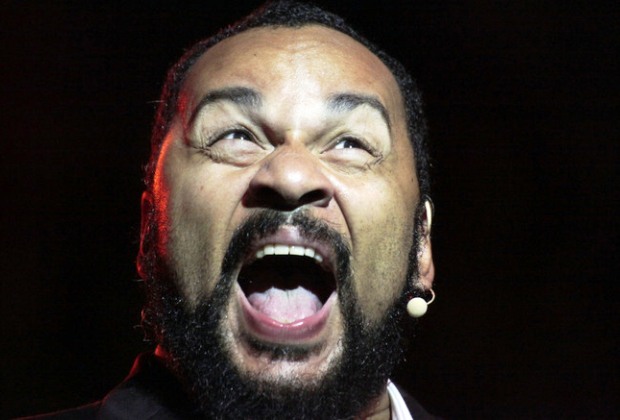
Dieudonné M’bala M’bala has been banned from entering the UK. The French comedian has long been a controversial figure in his home country, but he became internationally known when West Bromwich Albion striker Nicolas Anelka celebrated a goal with the now infamous quenelle — a sort of inverted nazi salute created by Dieudonné, his friend.
Dieudonné argues he is simply standing up to the establishment, and that the quenelle is an anti-establishment gesture. The facts tell a different story. He has made a number of clearly antisemitic comments, and has been convicted in France of inciting racial hatred.
Dieudonné was set to visit the UK to support Anelka, who has been charged by the Football Association over the incident, and faces a minimum five-match ban. As a colleague pointed out, it’s unclear how, exactly, further links to Dieudonné would help Anelka, but that is now beside the point, as he has been “excluded from the UK at the direction of the Secretary of State”. A letter from the Home Office, obtained by Swiss newspaper Tages-Anzeiger, states that he should not be allowed to board carriers to the UK. If he gets as far as the border, he’ll be turned away at the door, as it were.
But Dieudonné is not alone. Over the years, a number of controversial speakers, covering pretty much the entire spectrum of extremist ideologies, have been banned from entering the UK. The reasons given from the Home Office are almost always along the vague lines of the person in question not being “conducive to the public good”. Below are some the most high-profile cases.
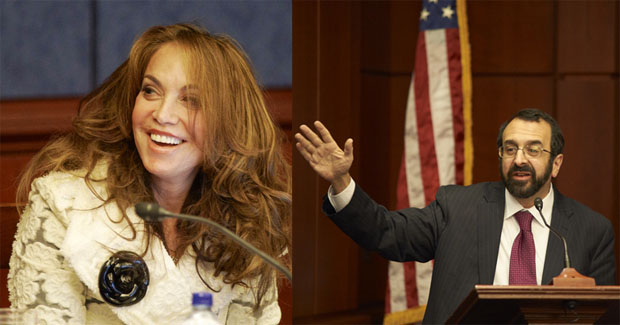
(Image: Mark Tenally/Demotix)
The American “counter-jihadists” were last May invited to speak at an EDL rally in Woolwich, London, at the scene of the brutal murder of Drummer Lee Rigby. However, they both received letters from the Home Office, informing them that based on past statements they were barred from entering the UK. One of Geller’s comments highlighted was: “Al-Qaeda is a manifestation of devout Islam… It is Islam.” In a joint statement, they declared that “…the British government is behaving like a de facto Islamic state. The nation that gave the world the Magna Carta is dead”.
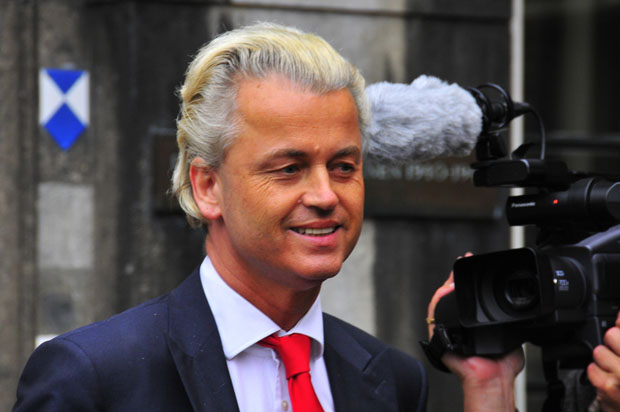
(Image: Frederik Enneman/Demotix)
In 2009, leader of the far-right Dutch Party for Freedom was set to travel to the UK to show his controversial film Fitna — which has been widely labelled as Islamophobic — in the House of Lords. Despite being told by the Home Office before travelling the he was barred from entry because his views “threaten community harmony and therefore public safety”, he still flew to Heathrow, where he was eventually stopped at the border. “Even if you don’t like me and don’t like the things I say then you should let me in for freedom of speech. If you don’t, you are looking like cowards,” was his message to British authorities at the time. The decision was later overturned.
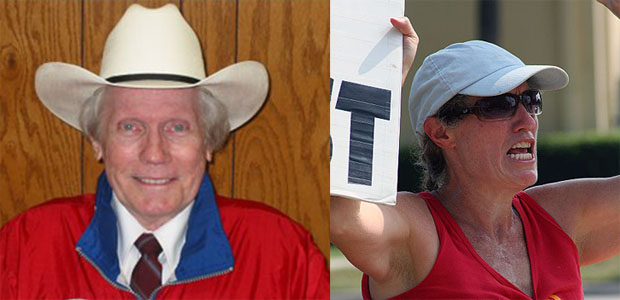
(Image: Wikimedia Commons)
The father and daughter, both members of the infamous Westboro Baptist Church — know, among other things, for picketing funerals — were planning on coming to Leicester to protest against a play about a man killed for being gay. The UK Border Agency said at the time: “Both these individuals have engaged in unacceptable behaviour by inciting hatred against a number of communities.”
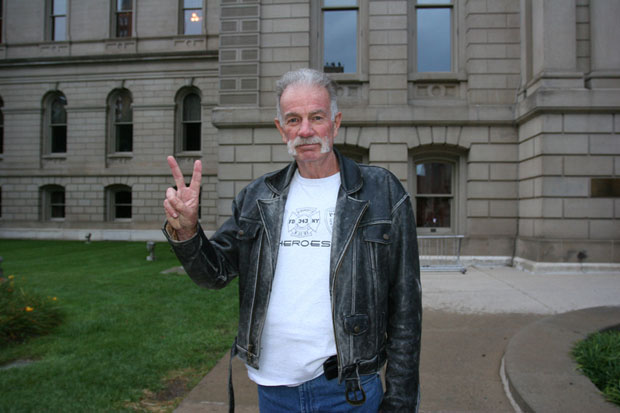
(Image: Mark Brunner/Demotix)
The American pastor became known across the world when he threatened to stage a mass burning of the Koran in 2010 to mark the anniversary of 9/11 — something which in the end did not take place. In 2011 he was invited to attend a number of demonstrations with far right group England Is Ours. However, he was banned by the Home Office, which cited “numerous comments made by Pastor Jones” and “evidence of his unacceptable behaviour”. Jones responded saying: “We feel this is against our human rights to travel and freedom of speech.”

(Image: Wikimedia Commons)
The then Belgium-based founder of the Arab European League spoke at a meeting of the Stop The War Coalition in March 2009. He left the country with the intention of coming back after a few days, only to discover that he was barred from entering Britain. His organisation had previously published “a series of antisemitic and Holocaust revisionist cartoons in response to the Danish Muhammad cartoons controversy.” Around the time of his visit, the president of the Board of Deputies, Henry Grunwald QC, wrote to then-Home Secretary Jacqui Smith “raising concerns about Jahjah”. In a post on his website, he said he believed his ban was “mainly to do with the lobbying of the Zionists”.
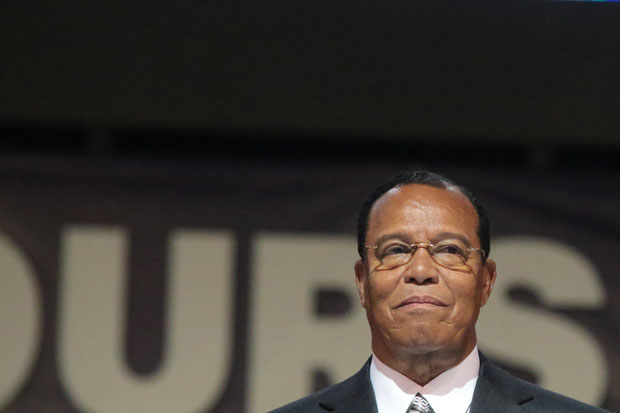
(Image: Thabo Jaiyesimi/Demotix)
The American Nation of Islam leader has been banned from entering the UK since 1986, due to racist and antisemitic remarks like calling Jews “bloodsuckers” and Judaism a “gutter religion”. The ban was briefly overturned in 2001 by a High Court ruling, but the government won out in the Appeals Court the following year.
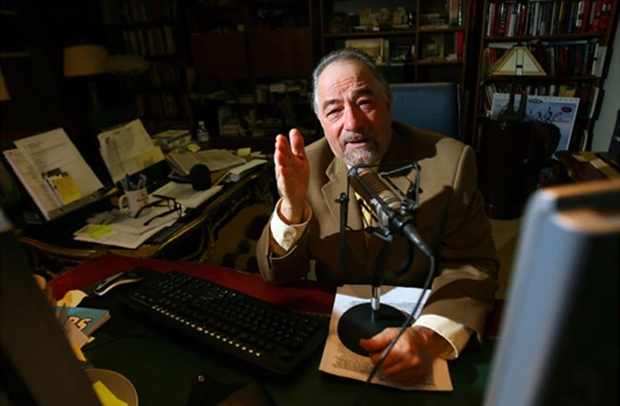
(Image: Clifford Dombrowski/YouTube)
In 2009, then Home Secretary Jacqui Smith announced a 16-person banned-list, made public in a bid to explain the authorities reasoning for barring people from entering the country. On the list was shock-jock Savage — a popular American talk radio host, who has outraged listeners with comments like “Latinos ‘breed like rabbits'” and “Muslims ‘need deporting'”. He was banned for being “likely to cause inter-community tension or even violence”. Savage reacted with disbelief, claiming he would sue Smith. The ban was reaffirmed in 2011.
This article was originally posted on 5 February 2014 at indexoncensorship.org
 It’s coming up to the seventh anniversary of the death of Hrant Dink. Just today, two people have been arrested in connection with his assassination.
It’s coming up to the seventh anniversary of the death of Hrant Dink. Just today, two people have been arrested in connection with his assassination.
Dink, a Turkish-Armenian journalist, understood censorship and free speech more than most. In Turkey, the Armenian genocide of the early 20th century remains taboo, and discussion of it can result in charges under the infamous article 301 of the country’s criminal code – the crime of “insulting Turkishness”.
Recognition of the genocide is an important part of Armenian identity, and many Armenians in the the country itself, Turkey, and the wider diaspora were pleased when, in 2006, French politicians proposed a law making denial of the Armenian genocide illegal. But Dink, understanding that censorious laws hurt everyone, dissented, saying:
“As you know, I have been tried in Turkey for saying the Armenian genocide exists, and I have talked about how wrong this is. But at the same time, I cannot accept that in France you could possibly now be tried for denying the Armenian genocide. If this bill becomes law, I will be among the first to head for France and break the law. Then we can watch both the Turkish Republic and the French government race against each other to condemn me. We can watch to see which will throw me into jail first”
Dink was assassinated, and the bill was blocked, though it reared its head again in 2012, only to be deemed unconstitutional.
One wonders what Dink would have made of president Francois Hollande’s bid to ban public performances by comic and political activist Dieudonne, inventor of the “qeunelle” gesture – an inverted Nazi salute dressed up as an “anti-establishment” gesture. Dieudonne, who ran on an “anti-Zionist” platform in the last election, says there is nothing anti-Semitic about the quenelle, a claim undermined by the spread of pictures of smirking fans quenelling near synagogues, holocaust memorials and even outside the Marseilles Jewish school where three children and a religion teacher were shot down in cold blood in 2012.
It’s important to be clear on this: the quenelle is an anti-Semitic gesture. Dieudonne’s defenders, such illustrious figures as Diane Johnstone and Alain Soral (what we might call the Counterpunch Left), will claim that it is not.
But that is because they are defending Dieudonne’s views, rather than Dieudonne’s right to free speech. It’s an important distinction. Too often, we either attempt to defend free speech by downplaying what’s actually being said (“it’s not that bad”), or claiming it’s something that it’s not (“this isn’t actually racist; it’s, er…”)
Similarly we attempt to justify shutting down free speech by saying something is not a matter of free speech, or worse, resorting to the fact of an existing law or prevalent social mores rather than making a moral argument (as Bernard-Henri Lévy did while discussing the Dieudonne case on theBBC’s Today programme).
A genuine defence of free speech demands that we look what’s happening directly in the eye.
The quenelle is anti-semitic. Dieudonne is anti-semitic. Dieudonne has a right to free speech.
Hrant Dink would have understood that.